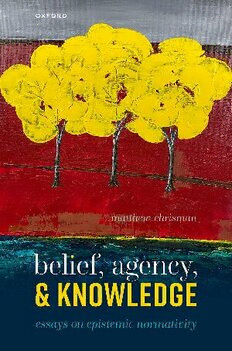
Belief, Agency, and Knowledge: Essays on Epistemic Normativity PDF
Preview Belief, Agency, and Knowledge: Essays on Epistemic Normativity
OUPCORRECTEDPROOF–FINAL,6/5/2022,SPi Belief, Agency, and Knowledge OUPCORRECTEDPROOF–FINAL,6/5/2022,SPi OUPCORRECTEDPROOF–FINAL,6/5/2022,SPi Belief, Agency, and Knowledge Essays on Epistemic Normativity MATTHEW CHRISMAN OUPCORRECTEDPROOF–FINAL,6/5/2022,SPi GreatClarendonStreet,Oxford,OX26DP, UnitedKingdom OxfordUniversityPressisadepartmentoftheUniversityofOxford. ItfurtherstheUniversity’sobjectiveofexcellenceinresearch,scholarship, andeducationbypublishingworldwide.Oxfordisaregisteredtrademarkof OxfordUniversityPressintheUKandincertainothercountries ©MatthewChrisman2022 ©2021Publicationordisseminationofthismanuscript withoutwrittenpermissionoftheauthorisexpresslyprohibited Themoralrightsoftheauthorhavebeenasserted Firstpublishedinpaperbackin2022 Impression:1 Allrightsreserved.Nopartofthispublicationmaybereproduced,storedin aretrievalsystem,ortransmitted,inanyformorbyanymeans,withoutthe priorpermissioninwritingofOxfordUniversityPress,orasexpresslypermitted bylaw,bylicenceorundertermsagreedwiththeappropriatereprographics rightsorganization.Enquiriesconcerningreproductionoutsidethescopeofthe aboveshouldbesenttotheRightsDepartment,OxfordUniversityPress,atthe addressabove Youmustnotcirculatethisworkinanyotherform andyoumustimposethissameconditiononanyacquirer PublishedintheUnitedStatesofAmericabyOxfordUniversityPress 198MadisonAvenue,NewYork,NY10016,UnitedStatesofAmerica BritishLibraryCataloguinginPublicationData Dataavailable LibraryofCongressControlNumber:2022932392 ISBN978–0–19–289885–2 DOI:10.1093/oso/9780192898852.001.0001 Printedandboundby CPIGroup(UK)Ltd,Croydon,CR04YY LinkstothirdpartywebsitesareprovidedbyOxfordingoodfaithand forinformationonly.Oxforddisclaimsanyresponsibilityforthematerials containedinanythirdpartywebsitereferencedinthiswork. OUPCORRECTEDPROOF–FINAL,6/5/2022,SPi ForDylanandMeryl OUPCORRECTEDPROOF–FINAL,6/5/2022,SPi OUPCORRECTEDPROOF–FINAL,6/5/2022,SPi Preface WhenIaskedmyfathertopaintapictureforthecoverofthisbook—andhasn’t hedoneitbeautifully!—heconsideredthetitleandsaid,“Well,Iknowwhatbelief andknowledgeare,butwhatareagencyandnormativity?”Hisinsightfulquestion capturesthecentralpuzzleofthisbook. We all intuitively understand what it is to believe something, and it’s easy to recognize differences between merely or even truly believing something, and genuinely knowing it. But knowledge is not just different from other kinds of belief—it’sbetter.Itissomethingweshould,atleastsometimes,pursue.Andwhen we have a knowledgeable belief, we should normally maintain it and stand prepared to share it with others. Insofar as these ‘should’s pertain to our under- standing of knowledge, they are a species of what most philosophers would recognize as “epistemic” norms. (The intended contrast is with ethical norms, thoughaswewillseetheremaybeanethicaldimensiontoepistemicnormativity.) Having identified some epistemic norms, we might say that activities such as inquiring, investigating, observing, recalling, reasoning, integrating, discussing, and debating are amongst the various ways that people exercise their “doxastic” agency in accordance with epistemic norms. That is to say, we don’t focus on bodily action with effects outside of a person’s mind but rather on the various cognitiveactivitiesthatpertaintotheirbeliefs(thoughweneedn’tinsistonasharp linebetweenwhat’sinthemindandwhat’soutsidethemind).Then,Iwanttosay thatexercisingone’sdoxasticagencyisacentralpartofwhatitistobenotonlya fullyhumanperson,butalsoaloverofwisdom,i.e.,aphilosopher. To a first approximation, then, this book is about how, in the abstract, all of these epistemic norms and doxastic activities work to generate and expand knowledgeablebeliefamongstloversofwisdom. People’s intellectual interests vary, of course. Some of us are interested in abstracttheoreticaltopics,othersinthepoliticalhistoryofmodernstates,others in the mating patterns of hermaphroditic flatworms, others in the evolution of NBAdefenses,andothersstillintheplightofBritneySpears.Personally,Iloveit all, including knowing about how knowing works across these various domains. Maybe that’s why I chose a career in philosophy, but I think most people are philosopherstoanextent.Andthisbookpertainstoallofusphilosophers.Init, Iinvestigatethenatureofhumanbeliefinitsrelationtoourexerciseofdoxastic agency,thecontentandforceofepistemicnorms,andthedeeplyhumanpractice ofkeepingtrackofhowwelleachother’sbeliefsliveuptothesenorms. OUPCORRECTEDPROOF–FINAL,6/5/2022,SPi viii WhenIbegantostudyphilosophyacademically,Iwasimpressedbythemodel of the individual intellect: thinking hard and mostly in solitude about a topic, ultimately expressing a novel and insightful vision for how to understand the world,andthenofferingittotherestofus,fullypolished.Ispentalotofmytime incollegeinthelibrary!WhetherreadingPlato,Aquinas,Descartes,Hume,Kant, Wittgenstein, Sartre, Sellars, or Rawls, one can easily get wrapped up in their uniquemodeofargumentation,imaginingthatthegoalofbeingaphilosopheris tocreatesomethinglikewhateachofthemcreated,apparentlyfromscratchand inrelativeisolation.Ihavecometothink,however,thatthisisnotgenerallyhow humanknowledgeiscreatedandspread—beitknowledgeaboutthemeaning of lifeorthelocationofthenearestshopsellingwine. Humans live in deeply interconnected and interdependent ways, and our intellectual pursuits are no exception. Furthermore, in the normal course of life, weformagreatmanyofourbeliefssofastandautomaticallythatitwouldbemore than a bit strained to say that most of our belief-forming cognitive activity is something we individually choose or control. Moreover, the evolutionary and social forces shaping the intuitive ways we naturally think and process informa- tion seem to operate in a mostly subterranean way that bypasses anything traditionalphilosopherswouldrecognizeasafacultyofreason. These observations reveal cracks in the “Great Man” theory of the history of philosophy,buttheyalsochallengetheveryassumptionthatbeliefandknowledge havemuchtodowiththeexerciseofsomekindofagency,oreventhatthereare validepistemicnorms.Howcantherebethingspeoplereallyshouldorshouldnot believe, if belief formation is mostly automatic? Why would we ever think someoneconstrainedbyarationalevolutionaryandsocialpressuresisresponsible forwhattheybelieve?But,ifwereallyvalueknowledgeinthewayweseemtodo, howcould therenotbetrueepistemicnormativeevaluationspertainingtointel- lectualactivityforwhichpeopleareresponsible?Thisbookrepresentsmyattempt toaddressthechallengeexpressedinthesequestions. For decades if not centuries, analytically-minded epistemologists have sought to explain the difference between true belief and knowledge by investigating the conceptsof ‘belief’and‘knowledge’,and the waythey aremediated byconcepts suchas‘justification’,‘reliability’,‘warrant’,‘evidence’,and‘reasonableness’.This project has often taken the form of an analysis of what it means to say that an individualSknowsthatp.Butithasalsotakenotherforms,suchasgenealogical, bio-functional, or pragmatic explications of the concepts involved in attributing knowledge to an individual. I think this project has taught us many interesting things about belief and knowledge, but I don’t think it has taught us very much about the connection between these and doxastic agency and epistemic normativity. Because of this, as I see things now, the most interesting epistemological questions are not (mainly) about what it means for an individual to know OUPCORRECTEDPROOF–FINAL,6/5/2022,SPi ix something, but about how people relate intellectually to other members of their epistemic communities, and how in turn those communities are maintained, expanded, and diversified by people related intellectually to each other. Accordingly, in this book, I often address specific debates within what might be called“individualistic”epistemology,butIalwaysdosowiththeunderlyingaim of showing how examining the relevant issues through the lens of a resolutely social epistemology has significant promise for enriching our understanding of theseissues. JusttogiveoneexampleItouchonbrieflyinChapter7,buthopetopursuein moredetailinfuturework:Manypeopleareinterestedinwhatittakesforpeople’s beliefs to be free. To answer this question, the traditional approach would investigate the conditions of individual cognitive control and rational self- determination of particular beliefs: What does it take for an individual to have orlacktheabilitytomakeuptheirownmindaboutwhethersomepropositionis true? In contrast, a more social-epistemological approach encourages investiga- tion into the social and political conditions leading to or protecting against the dominatinginfluenceofotherpeopleoninterconnectedpeople’ssystemsofbeliefs. Propaganda,indoctrination,epistemicbubbles,advertising,adaptivepreferences, andclassinterestscanalldetractfromfreedomofbelief,whereasgoodeducation, well-organized distribution of and reliance on expertise, open and transparent channels of communication, and political norms of free speech can all enhance freedom of belief—how can we explain that? The metaphysics and politics of doxasticfreedomarebothvalidprojects,buttheycan’tbedoneinisolation,and I think epistemologists have spent a lot of effort on the former, without doing enoughtoexplorethelatter. The role of our social interconnectedness has been all the more salient to me over the past two years. I completed this book during the global Covid-19 pandemic, which has upended the ways welive together, both epistemically and medically. Daily bulletins with public health knowledge have become the norm, and now it isn’t only the epidemiologists who regularly worry about the role of shared appreciation of scientific expertise and collective knowledge in keeping people safe and alive. From the political role of the anti-vax movement to the markedlydifferentresponsesvariousgovernmentshavetakentowardstheirown scientificexperts,fromthestatisticalbasisofr-numberstotheimperfectstateof scientific knowledge about the effectiveness of facemasks—recent conversations amongstfriendsandfamilyhavetakenadistinctivelysocial-epistemologicalturn. Morepersonally,ithasbeenantoughcoupleofyears.Formonthsandmonths, seeing extended family and gathering in-person with groups of friends was prohibited,andmywife Jeanand Iweretryingto continueworkingwhile being primaryschoolteachersforouryoungchildrenwithlimitedsupport.Plus,Iwas supposedtobewritingabook!
